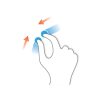“The Role of PINCH in Chronic Energy Deficit in the CNS.”
The National CFIDS Foundation PINCH study is a timely one given the interest in neuroinflammation in ME/CFS. Hopefully over the next year we'll get a positive brain imaging study that indicates neuroinflammation in present in chronic fatigue syndrome (ME/CFS). With the NCF's PINCH study starting up it's possible we could get another verification of neuroinflammation. (I'll feel like pinching myself if that happens
PINCH stands for "Particularly interesting new cysteine-histidine-rich protein". This protein has been most prominently shown to be released during HIV/AIDS infection of the brain, but has also been found in the periphery in the dorsal root ganglia after neuronal injury.
[fright]
A 2011 study indicated that PINCH is often liberated by inflammatory cytokines produced by the microglia such as TNF-a.The increased TNF-a levels may reflect the presence of a pathogen or some other factor.
Increased levels of PINCH are also associated with a protein called hp-tau that's often accumulated in the brains of people with neurodegenerative diseases such as Alzheimer's, Dementia and HIV-associated brain injury. It's not clear exactly what PINCH is doing but it appear to assist the brain in ridding itself of these dangerous proteins. It may also be trying to repair damaged neurons.
The investigator funded by the National CFIDS Foundation, Dr. Dianne Langford of Temple University, is one of the most foremost PINCH investigators.
The PINCH ME/CFS Study
National CFIDS Foundation funds Temple University Neuroscience Researcher Press Release — October 14th, 2015
The National CFIDS Foundation Inc. (NCF) is pleased to announce Dr. Dianne Langford as its latest research grant recipient. Dr. Langford is an Associate Professor of Neuroscience and Neurovirology in the Neuroscience Department at the Temple University School of Medicine in Philadelphia. Dr. Langford's $150,019 grant is titled, “The Role of PINCH in Chronic Energy Deficit in the CNS.”
According to Alan Cocchetto, NCF Medical Director, “PINCH is a protein found in damaged neurons and is a biomarker for brain injury. Dr. Langford's assistance has been very important to our understanding of a specific neuropathology potentially associated with CFIDS. This grant will greatly extend our preliminary efforts undertaken to date and is aimed at increasing our knowledge of the CFIDS disease process.”
Attachments
Last edited:













